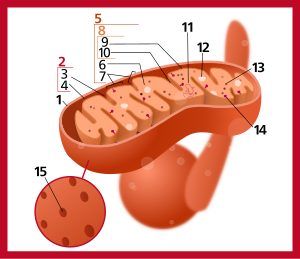线粒体嵴
线粒体嵴(英语:mitochondrial cristae)简称“嵴”,是线粒体内膜向线粒体基质折褶形成的一种结构。线粒体嵴的形成增大了线粒体内膜的表面积,让呼吸作用的耗氧化学反应可以更快进行。嵴膜上有很多蛋白质,包括ATP合酶和各种细胞色素。
| 细胞生物学 | |
|---|---|
| 线粒体 | |
 |
形状
编辑在不同种类的细胞中,线粒体嵴的数目、形态和排列方式可能有较大差别。线粒体嵴主要有几种排列方式,分别称为“片状嵴”(lamellar cristae)、“管状嵴”(tubular cristae)和“泡状嵴”(vesicular cristae)。[1]片状排列的线粒体嵴主要出现在高等动物细胞的线粒体中,这些片状嵴多数垂直于线粒体长轴;管状排列的线粒体嵴则主要出现在原生动物和植物细胞的线粒体中。有研究发现,睾丸间质细胞中既存在层状嵴也存在管状嵴。[2]某些形态特殊的线粒体嵴由于没有ATP合酶,所以不能合成ATP。
目前不清楚这些形状的产生是否共用一种模式。泡状嵴等不合成ATP的结构可能不属于线粒体嵴。[3]
结构
编辑当科学家发现线粒体有两层膜之后,线粒体亚显微结构的先锋们提出了三种结构假说:[4]
- 导风板模型(baffle, 1953):帕拉德认为,线粒体嵴内膜像导风板一样排列,嵴内外空间的开口很大。这个模型被相信了很久,是教科书用图的主要模型。
- 隔膜模型(septa, 1953):斯特兰德认为,线粒体内膜的排列像一层层隔膜一样,把线粒体基质切开。[5]
- 嵴口模型(crista junction, 1966):达姆斯和威斯认为,线粒体嵴内外由嵴口这一种细小的管状结构连接。这些结构最近(2008)经过电子显微镜断层成像技术被重新发现,成为了目前主要接受的模型。[6]
线粒体嵴上有许多有柄小球体,旧称线粒体基粒(elementary particle)或氧化体(oxysome),基粒中含有ATP合酶,能利用呼吸链产生的能量合成三磷酸腺苷(ATP)。所以需要较多能量的细胞,线粒体嵴的数目一般也较多。[7]ATP合酶在膜内形成二聚体。这些二聚体会排成长条,让内膜形成弯曲,可能是嵴形成的第一步。[8]这些二聚体处于嵴的最内侧。[9]
线粒体嵴口上排列着一种叫做线粒体接触部位嵴组织体系(contact site cristae organizing system, MICOS)的蛋白质复合体。OPA1等蛋白质负责嵴的重塑。[9]
功能
编辑线粒体嵴主要负责ATP合成。
参考文献
编辑- ^ Hanaki M, Tanaka K, Kashima Y. Scanning electron microscopic study on mitochondrial cristae in the rat adrenal cortex. Journal of Electron Microscopy. 1985, 34 (4): 373–380. PMID 3837809 (英语).
- ^ Frederick P. Prince. Mitochondrial cristae diversity in human Leydig cells: a revised look at cristae morphology in these steroid-producing cells. Anat Rec. Apr 1, 1999, 254 (4): 534–541. PMID 10203260 (英语).
- ^ Stephan, Till; Roesch, Axel; Riedel, Dietmar; Jakobs, Stefan. Live-cell STED nanoscopy of mitochondrial cristae. Scientific Reports. 27 August 2019, 9 (1). doi:10.1038/s41598-019-48838-2 .
- ^ Griparic, L; van der Bliek, AM. The many shapes of mitochondrial membranes.. Traffic. August 2003, 2 (4): 235–44 [2020-02-06]. PMID 11285133. doi:10.1034/j.1600-0854.2001.1r008.x. (原始内容存档于2020-02-05).
- ^ Sjostrand, F. Systems of double membranes in the cytoplasm of certain tissue cells. Nature. Jan 3, 1953, 171 (4340): 31–32. doi:10.1038/171031a0.
- ^ Zick, M; Rabl, R; Reichert, AS. Cristae formation-linking ultrastructure and function of mitochondria.. Biochimica et Biophysica Acta. January 2009, 1793 (1): 5–19. PMID 18620004. doi:10.1016/j.bbamcr.2008.06.013.
- ^ Frederick P. Prince. Lamellar and tubular associations of the mitochondrial cristae: unique forms of the cristae present in steroid-producing cells. Mitochondrionjili. Feb 2002, 1 (4): 381–389. PMID 16120292. doi:10.1016/S1567-7249(01)00038-1 (英语).
- ^ Blum TB, Hahn A, Meier T, Davies KM, Kühlbrandt W. Dimers of mitochondrial ATP synthase induce membrane curvature and self-assemble into rows. Proceedings of the National Academy of Sciences of the United States of America. March 2019, 116 (10): 4250–4255. PMID 30760595. doi:10.1073/pnas.1816556116.
- ^ 9.0 9.1 Baker, Nicole; Patel, Jeel; Khacho, Mireille. Linking mitochondrial dynamics, cristae remodeling and supercomplex formation: How mitochondrial structure can regulate bioenergetics. Mitochondrion. November 2019, 49: 259–268. doi:10.1016/j.mito.2019.06.003.
- ^ Thar,R. and M.Kühl. Propagation of electromagetic radiation in mitochondria? (PDF). J.Theoretical Biology. 2004, 230 (2): 261–270 [2022-07-13]. (原始内容 (PDF)存档于2013-07-18) (英语).